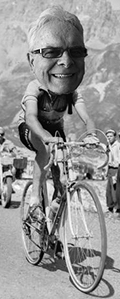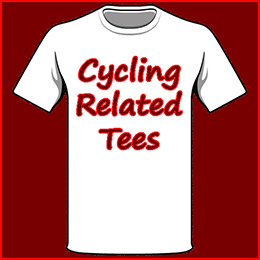Education or Enforcement
 Mon, March 4, 2019
Mon, March 4, 2019
 There are two ways to apply cycling laws, education or enforcement.
There are two ways to apply cycling laws, education or enforcement.
Going to school in the UK at least twice a year there would be a special lesson on the Highway Code.
A little Highway Code book would be given to us to take home and keep.
It not only had all the rules and laws as applied to driving a car, it laid out those that applied to riding a bicycle and pedestrians.
It was drummed into us, when you cross the street, stop, look right, look left, look right again, (Traffic came from the right in the UK.) if the road is clear then cross.
This was war time Britain of the 1940s and due to petrol rationing there were few cars on the road, especially in the rural area I lived at the time. Never-the-less when we crossed the street we went through this ritual of look right, look left.
There were cycling proficiency tests too, where we would bring our bikes to school and the local police constable would come in and instruct us on how to ride our bike both safely and in compliance with the law.
The result was when I started cycling seriously in the 1950s, I never rode on the pavement, (Sidewalk.) I never rode through red lights, and my bike always had a front and rear light when riding after dark. As for riding a bike on the wrong side of the road, toward traffic, that would be so crazy it would not even be considered.
It was somewhat of a culture shock when I came to the US in 1979 and went for a ride with the local club. The first red light we came to I stopped and everyone else kept going.
It would not be unusual to find a cyclist riding towards me on my side of the road. This led to the quandary, do I pull out in the traffic lane and let him pass on the inside, or hold my course and hope he goes around me? I usually took the initiative and went for the first option.
I remember reading of a case in New Jersey where two cyclists riding at night without lights hit head on because one was on the wrong side. Their heads hit, neither was wearing a helmet. One died instantly, the other had serious head injuries.
Young kids on BMX bikes would jump from the sidewalk to the center of the road, and then wait for a gap in opposing traffic before hopping over to the opposite sidewalk. It was a free for all, with no rules being observed or enforced. Today, from what I read, it is no better in the UK, it seems the Highway Code is no longer taught in schools.
Stuff drummed into me as a kid has stayed with me to this day, so believe me I understand why some cyclists ride through red lights. It is what they have always done since they were a kid, no one said they shouldn't do it.
“If I stop for a red light, even if there is no other traffic in sight, it is not because I am somehow better than the cyclist who just rides on through. It is because not to stop feels uncomfortable, and goes against a lifetime habit.”
Habits, even lifetime habits can be changed with a little conscious effort. Getting in the habit of obeying traffic laws while riding a bike would be a good thing for all cyclists to do right now. I am reading of a ticket writing blitz going on in New York, it will not surprise me if this happens in other cities in the US as cycling becomes more popular and more and more cyclists take to the streets.
Recently a cyclist was killed by a hit and run driver in NY City. As usual the culprit was never found, but as a result, police started issuing more tickets to cyclists. Critics are saying it is unfair to clamp down on cyclists in this manner. I am inclined to agree to a certain extent. It is unfair that a cyclist should pay the same fine for running a red light that a motorist has to pay.
However, it is quite simple to avoid getting one of these tickets, don't run red lights. Also, whoever said life is fair? It is unfair that I am forced to take my shoes off at the airport, because one idiot tried to blow up a plane with a bomb in his shoe.
One Brooklyn cyclist got three tickets. One for riding his bike on the sidewalk, another riding against the flow of traffic, and a third for mouthing off to the cop who was giving him the ticket. All three of these tickets could have been avoided, had this particular cyclist not become accustomed to riding his bike where ever and however he please.
Laws regarding cyclists running red lights and other infractions are in place everywhere right now, so too are fines set. Because the police have not enforced these laws in the past, it may seem unfair when they suddenly start issuing tickets.
There are ways to get people to follow the rules. You educate, preferably at an early age as happened with me, it then becomes a lifetime habit. Or you start fining people as a deterrent.
I find obeying the law as I ride my bike, does not affect my cycling pleasure, it does not slow me down all that much either. And if my local law enforcement starts issuing tickets to cyclists, it will not affect me.
Those who get tickets will no doubt continue to say how unfair it is, and how they’ve always ridden on the sidewalk or went through red lights. I may sympathize, but I doubt I will be offering to pay their fine.



























Rights and Privileges
As cycling becomes more and more popular, more people choose to ride a bike to work each day rather than drive. We start to hear calls for cyclists to be licensed, or a tax imposed, in the same way automobile drivers are licensed and taxed.
The idea of licensing cyclists usually comes from city governments rather than on a state or national level. The argument is usually along the lines that bike lanes and other facilities cost money, and it only seems fair that cyclists should pay some of this cost.
However, in practical terms any attempt to tax or license cyclists in the past has always turned out to be a bureaucratic nightmare. It always costs more to implement such a plan than the income generated. Plus law enforcement and the court system has to then impose fines on those not having a license.
Sidewalks have been in place in cities everywhere since before the beginning of the last century, and no one has ever suggested that pedestrians should pay for sidewalks. Sidewalks make it safer to walk, bike lanes make it safer to ride a bicycle. And anyway revenues from drivers’ licenses or even road taxes do not pay for roads. So really that should be the end of that argument.
When automobiles first appeared there were no laws or regulations, you could simply buy a car, jump in and drive it. Pretty much in the same way as we can buy a bicycle today and ride it anywhere.
Later because of wholesale carnage on the roads, laws were passed and licenses issued to drivers. As a result, driving is a privilege, one that can be taken away, whereas cycling like walking is a right. Although cyclists and pedestrians are still subject to the laws of the road. It appears no one can be prevented from walking or riding a bike, even if they break the law.
So what is a right? There are so called God given rights, but as people have the right to choose whether they believe in God or not, how does that work? If you don't believe in God, do you not have any God given rights? Are you obliged to respect other people's God given rights? As it is, the only God given right I can think of is our right to live.
If you look at The Bill of Rights there are very few actual rights. I don’t see a right to ride a bicycle mentioned. There is the right to bear arms, the right to practice a religion of your choice, etc.
After that it appears the function of government (In theory anyway.) is to leave us alone, and we are free to do as we please as long as we follow certain laws wherever they apply. It appears to me that rights are rarely granted, they are simply taken for granted. Is riding a bicycle on the highway is a prime example this?
I know to even suggest such a thing will cause outrage among a great many cyclists, but before we all get our anti-bacterial padded shorts in a twist, let’s think about this. In recent years cell phones have become available and some assume it is their right to own one and talk and send text messages whenever they please, including while driving.
It turns out this is not such a good idea so in some places this practice is being outlawed. Have people lost a right, or was it just an assumed right in the first place?
A few years ago, people had the right to smoke just about anywhere they pleased. However, that right infringed on everyone else’s right not to breathe secondhand smoke. So, now that right has gradually been taken away, and smokers are now privileged to smoke in fewer and fewer places.
Because riding a bicycle on public roads is for the most part not a danger to other road users, it is doubtful than anyone will stop us doing it. Cycling is a good idea. It cuts down on congestion in our cities, it is better for the environment, and it should be encouraged because it is good for the physical and mental well-being of the participant.
My question is, are there any true rights or privileges? Or is this just an ongoing daily debate among millions of people, on the streets, on the talk shows and in the courtrooms? We all have certain rights, and we get to keep them as long as they don't infringe on the rights of others. If they do we may lose those rights, it is happening all the time.
In which case there is little difference between rights and privileges, either can be taken away. We should all remember this and in particular those cyclists who blatantly and regularly flout the laws of the road.